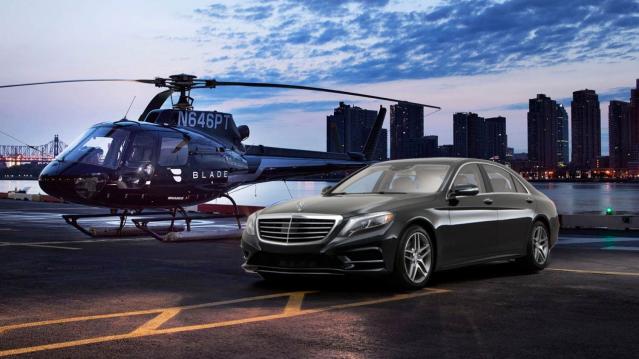Meet Blade, the Uber for Helicopters in NYC

Uber may be convenient, but New York’s Hamptons set doesn’t always have the time or patience to deal with the traffic getting out to their summer spots on Long Island’s East End.
Blade, which calls itself “the first digitally driven short distance aviation company,” says it has a solution for those who want to get to East Hampton within the hour, or Southampton in 35 minutes: Ordering their own chartered helicopter via an app.
Related: 10 Biggest Tech Flops of the Century
Once you download the app, you can select your flight time, chill out in a Blade lounge at a Manhattan heliport and then enjoy “a snack, a drink, a newspaper and lots of other fun things” on your flight. Passengers are allowed one carry-on weighing 25 lbs. maximum — but no golf clubs.
The service, which launched in May 2014, doesn’t come cheap, at $595 per seat to go to Quogue, Southampton, East Hampton, Montauk or Fire Island. Blade can also be booked for trips to Nantucket, Martha’s Vineyard, Cape Cod and some other destinations in the Northeast as well as to the New York area’s major airports.
The website advises that if your flight is grounded due to bad weather, you’ll be offered a ride to your destination in a chauffeured Mercedes at no extra cost.
Top Reads from The Fiscal Times:
- The Best Things to Charge on Your Credit Card
- The Wealthy Worry, Too—And It’s Not All About Money
- 10 Best Islands in the World
Deficit Hits $738.6 Billion in First 8 Months of Fiscal Year

The U.S. budget deficit grew to $738.6 billion in the first eight months of the current fiscal year – an increase of $206 billion, or 38.8%, over the deficit recorded during the same period a year earlier. Bloomberg’s Sarah McGregor notes that the big increase occurred despite a jump in tariff revenues, which have nearly doubled to $44.9 billion so far this fiscal year. But that increase, which contributed to an overall increase in revenues of 2.3%, was not enough to make up for the reduced revenues from the Republican tax cuts and a 9.3% increase in government spending.
Tweet of the Day: Revenues or Spending?

Rep. Kevin Brady (R-TX), ranking member of the House Ways and Means Committee and one of the authors of the 2017 Republican tax overhaul, told The Washington Post’s Heather Long Tuesday that the budget deficit is driven by excess spending, not a shortfall in revenues in the wake of the tax cuts. The Wall Street Journal’s Kate Davidson provided some inconvenient facts for Brady’s claim in a tweet, pointing out that government revenues as a share of GDP have fallen significantly since 2015, while spending has remained more or less constant.
Chart of the Day: The Decline in IRS Audits

Reviewing the recent annual report on tax statistics from the IRS, Robert Weinberger of the Tax Policy Center says it “tells a story of shrinking staff, fewer audits, and less customer service.” The agency had 22% fewer personnel in 2018 than it did in 2010, and its enforcement budget has fallen by nearly $1 billion, Weinberger writes. One obvious effect of the budget cuts has been a sharp reduction in the number of audits the agency has performed annually, which you can see in the chart below.
Number of the Day: $102 Million

President Trump’s golf playing has cost taxpayers $102 million in extra travel and security expenses, according to an analysis by the left-leaning HuffPost news site.
“The $102 million total to date spent on Trump’s presidential golfing represents 255 times the annual presidential salary he volunteered not to take. It is more than three times the cost of special counsel Robert Mueller’s investigation that Trump continually complains about. It would fund for six years the Special Olympics program that Trump’s proposed budget had originally cut to save money,” HuffPost’s S.V. Date writes.
Date says the White House did not respond to HuffPost’s requests for comment.
Americans See Tax-Paying as a Duty

The IRS may not be conducting audits like it used to, but according to the agency’s Data Book for 2018, most Americans still believe it’s not acceptable to cheat on your taxes. About 67% of respondents to an IRS opinion survey “completely agree” that it’s a civic duty to pay “a fair share of taxes,” and another 26% “mostly agree,” bringing the total in agreement to over 90%. Accounting Today says that attitude has been pretty consistent over the last decade.



